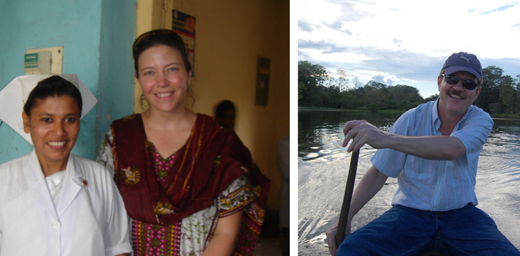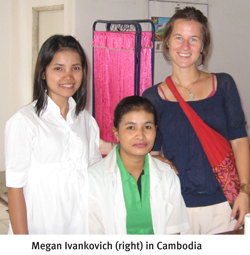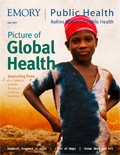A gift for serving others

Shauna Mettee (left in Bangladesh), and Javier Guiterrez (right) in Columbia.
RSPH students Shauna Mettee and Javier Guiterrez are among six university students who received Emory's Humanitarian Award for 2009.
|
In Brief Responding to public health crises |
A physician, Javier Gutierrez, o9MPH, founded the only health clinic serving the poor in an all-but-forgotten corner of the Colombian Amazon. A registered nurse, Shauna Mettee, 09MSN/MPH, harnessed the energy of students and her own passion for service to broaden Emory's community outreach. Both are among the six students who received the 2009 Emory University Humanitarian Award for serving others. In 1989, fresh out of Bogota's best medical school, Gutierrez set out for an obligatory "rural year" with little more than a stethoscope and a suitcase full of clothes. Arriving in Letícia, a jungle outpost near the Brazilian border, he thought he would soon be back in Bogotá, working in a private hospital. "I never imagined I might stay," he says.
As the sole source of care for a population with one of the highest maternal mortality rates in Colombia, not to mention widespread malnutrition and diarrhea among children under age 5, Gutierrez encountered maladies that urban physicians rarely see. In attending his patients, he established bonds with the local community that would not easily be broken—not by the higher pay of private practice or by the frustrations of working in a resource-strapped setting.
Gutierrez did return to Bogotá, but only briefly—to complete an ob/gyn residency. Soon, he and his wife Gloria, an anesthesiologist, were back in Letícia, seeing patients at the same hospital. They worked there for six years before the hospital went bankrupt and closed its doors. "It was at that moment that we decided to go out on our own," he says. "We needed work, and the community needed health services."
In 2000, the couple founded Clinica Letícia, housed in a small hotel on the edge of town. With their personal savings and loans from friends, they leased the building and refurnished it. Today, it is a thriving community clinic offering general medical services and some specialized care.
"We have 110 full-time employees, 28 beds, two surgical rooms, two delivery rooms, and an ER," says Gutierrez. "And since there isn't transportation for people who live far away, we go into the jungle to find them."
Stanley Foster, professor of global health, is impressed. "Many countries require their medical graduates to work in different rural areas," says Foster, who nominated Gutierrez for the Humanitarian Award. "I've met few people who have returned to work in that area on a long-term basis. Javier breaks the mold."
Forging new alliances
The same is true of Shauna Mettee, who expanded the scope of Emory's Student Outreach and Response Team (SORT) to more effectively respond to disease outbreaks and health emergencies.
In the process, Mettee forged an alliance with the CDC to allow SORT volunteers to assist with outbreak investigations into food-borne diseases, including the recent salmonella poona outbreak in North America. In collaboration with the American Red Cross, she organized a daylong training session on disaster response for RSPH students with nearly 100% participation on a Saturday morning.
Determined to empower others, Mettee also serves as a board member and volunteer with Mad Housers, which builds shelters for the homeless in Atlanta.
"Shauna has volunteered with Mad Housers for the past six years," says Rollins Professor of Epidemiology Ruth Berkelman, who nominated Mettee. "Whether she's assisting with finances, generating publicity, or seeking out volunteers, she has always done what needs to be done."
A native of Colorado, Mettee enrolled in the RSPH to pursue her interests in global health and holistic clinical practice. Both skill sets proved invaluable last summer when she worked in rural Bangladesh to improve treatment of women with obstetric emergencies.
Several years earlier, while completing a CDC Emerging Infectious Diseases Laboratory Fellowship, Mettee discovered her calling. "I was going on outbreak investigations, including a cholera outbreak in Guinea-Bissau in West Africa, with Epidemic Intelligence Service (EIS) officers," she says. "It's been a dream of mine to join them."
After she graduates in May, Mettee will join the U.S. Public Health Service as an EIS officer in July. —Patrick Adams, 09MPH
|
||||


 Advocating for women's health
Advocating for women's health